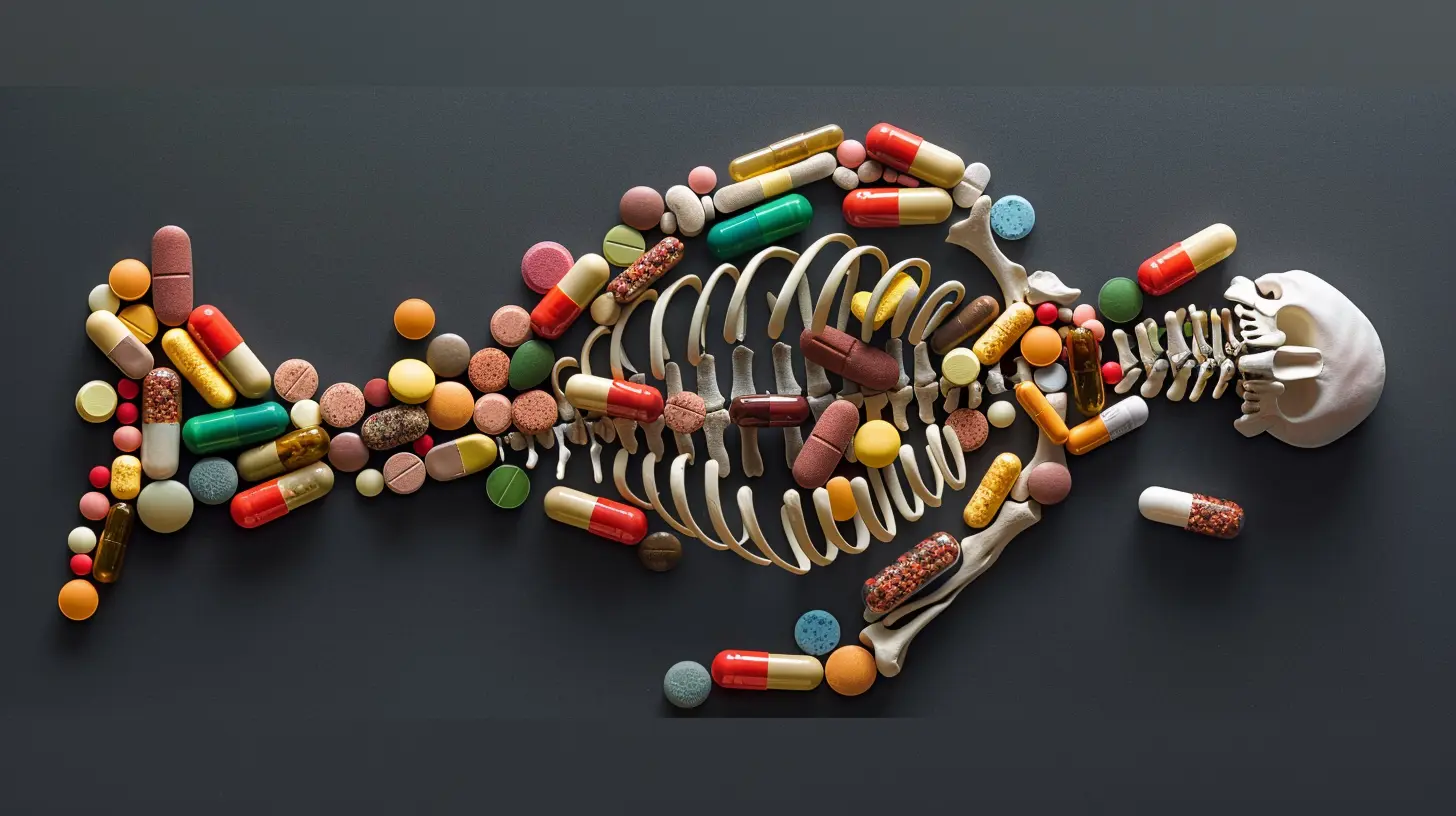Can Your Medications Be Affecting Your Bone Strength?
3 June 2025
Ever wondered if the pills you pop every day could be silently weakening your bones? You’re not alone! Many people don’t realize that certain medications can impact bone health, making them more fragile over time. While medications help manage conditions like asthma, depression, and acid reflux, some can take a toll on your bones in the long run.
So, let's break it down—how do medications affect your bone strength, which ones should you watch out for, and what can you do to keep your bones strong while still taking the meds you need?

How Medications Impact Bone Health
Your bones are living tissue, constantly breaking down and rebuilding. However, some medications interfere with this process by:- Slowing down bone formation – Your body makes new bone cells slower than they are being lost.
- Increasing calcium loss – Calcium is essential for bone strength, and certain drugs can cause your body to lose more of it.
- Affecting hormone levels – Some medications mess with hormones like estrogen and testosterone, which are crucial for maintaining bone density.
Now, let's talk about the common culprits!

Medications That May Weaken Your Bones
1. Corticosteroids (Prednisone, Cortisone)
Ever taken steroids for asthma, arthritis, or an autoimmune disease? Long-term use of corticosteroids like prednisone can seriously weaken bones. These drugs reduce calcium absorption and increase calcium loss from the bones, making them brittle and prone to fractures.What You Can Do: If steroids are a must, talk to your doctor about taking the lowest possible dose for the shortest time. Also, ensure you're getting enough calcium and vitamin D!
2. Proton Pump Inhibitors (PPIs) – Omeprazole, Lansoprazole
These are the go-to drugs for acid reflux and GERD (gastroesophageal reflux disease). PPIs reduce stomach acid, which sounds great for heartburn… but not so great for your bones. Why? Because stomach acid helps absorb calcium, and low calcium levels can lead to weaker bones over time.What You Can Do: If you rely on PPIs long-term, ask your doctor if you can switch to a lower dose or use an alternative treatment like H2 blockers. Also, focus on calcium-rich foods!
3. Selective Serotonin Reuptake Inhibitors (SSRIs) – Fluoxetine, Sertraline
Antidepressants can be lifesaving, but some studies have linked SSRIs to lower bone density. These medications may interfere with bone-building cells, leading to an increased risk of fractures—especially in older adults.What You Can Do: If you're on SSRIs, make sure you’re getting enough calcium, vitamin D, and regular weight-bearing exercise—think walking, jogging, or lifting weights.
4. Anticonvulsants – Phenytoin, Carbamazepine
Used to treat epilepsy and mood disorders, anticonvulsants can interfere with the way your body processes vitamin D. Since vitamin D is crucial for calcium absorption, a deficiency can lead to weaker bones over time.What You Can Do: Ensure your vitamin D levels are adequate. Your doctor might recommend a supplement to keep your bones in top shape.
5. Loop Diuretics – Furosemide, Bumetanide
These are commonly prescribed for high blood pressure and heart failure, but they can lead to calcium loss through urine. Over time, this can contribute to bone thinning.What You Can Do: Stay hydrated and include plenty of calcium-rich foods in your diet. Also, discuss with your doctor whether a potassium-sparing diuretic could be a better option for you.
6. Glucocorticoids – Dexamethasone, Hydrocortisone
Different from corticosteroids, glucocorticoids are used for inflammatory diseases and immune system suppression. Unfortunately, they can speed up bone loss and reduce bone formation.What You Can Do: If long-term use is necessary, ask your doctor about bone density monitoring and possible preventive treatments.
7. Excessive Thyroid Hormone – Levothyroxine
If you’re on thyroid medication for hypothyroidism, listen up! Taking too high a dose of levothyroxine can speed up bone turnover, leading to bone loss.What You Can Do: Regular thyroid level checks can ensure you're on the right dose.

How to Protect Your Bones Without Stopping Essential Medications
Giving up necessary medications isn’t always an option—but don’t worry; there are ways to counteract their effects on your bones!1. Boost Your Calcium Intake
Your bones love calcium! Make sure you're getting enough from:- Dairy products (milk, cheese, yogurt)
- Leafy greens (kale, spinach, collard greens)
- Fortified foods (orange juice, cereals)
- Nuts and seeds (almonds, chia seeds)
2. Don't Skip Vitamin D
Vitamin D is the key that unlocks calcium absorption. Sunlight is a great source, but you can also get it from fatty fish, eggs, and fortified foods—or take a supplement if needed.3. Move That Body!
Weight-bearing exercises like walking, jogging, dancing, and resistance training can strengthen bones and reduce the risk of fractures. Bonus? They also boost your mood and energy levels!4. Cut Down on Bone Thieves
- Limit caffeine and alcohol – Too much can interfere with calcium absorption.- Quit smoking – It weakens bones and slows down healing if you do get a fracture.
5. Get a Bone Density Test
If you're taking medications known to affect bone strength, talk to your doctor about a bone density test (DEXA scan). This can help detect early signs of bone loss before a fracture happens.
Final Thoughts
Your meds might be doing wonders for one part of your health, but don’t forget about your bones in the process! If you’re taking medications that can weaken bone density, it’s crucial to take proactive steps—like eating a bone-friendly diet, staying active, and checking in with your doctor.At the end of the day, balance is everything. By making small changes, you can keep both your health and your bones in check!
all images in this post were generated using AI tools
Category:
Bone HealthAuthor:

Holly Ellison
Discussion
rate this article
2 comments
Georgia Patterson
Thank you for this insightful article! It's crucial to consider medication effects on bone health. Great information!
June 12, 2025 at 3:49 AM

Holly Ellison
Thank you for your kind words! I'm glad you found the article valuable. Bone health is indeed an important topic!
Elowyn McNair
Great article! It’s crucial to consider how certain medications can impact bone health. Regular check-ups and discussions with healthcare providers about potential side effects can help maintain strong bones.
June 3, 2025 at 4:17 AM

Holly Ellison
Thank you! I completely agree—regular check-ups and open conversations about medications are essential for maintaining bone health.


